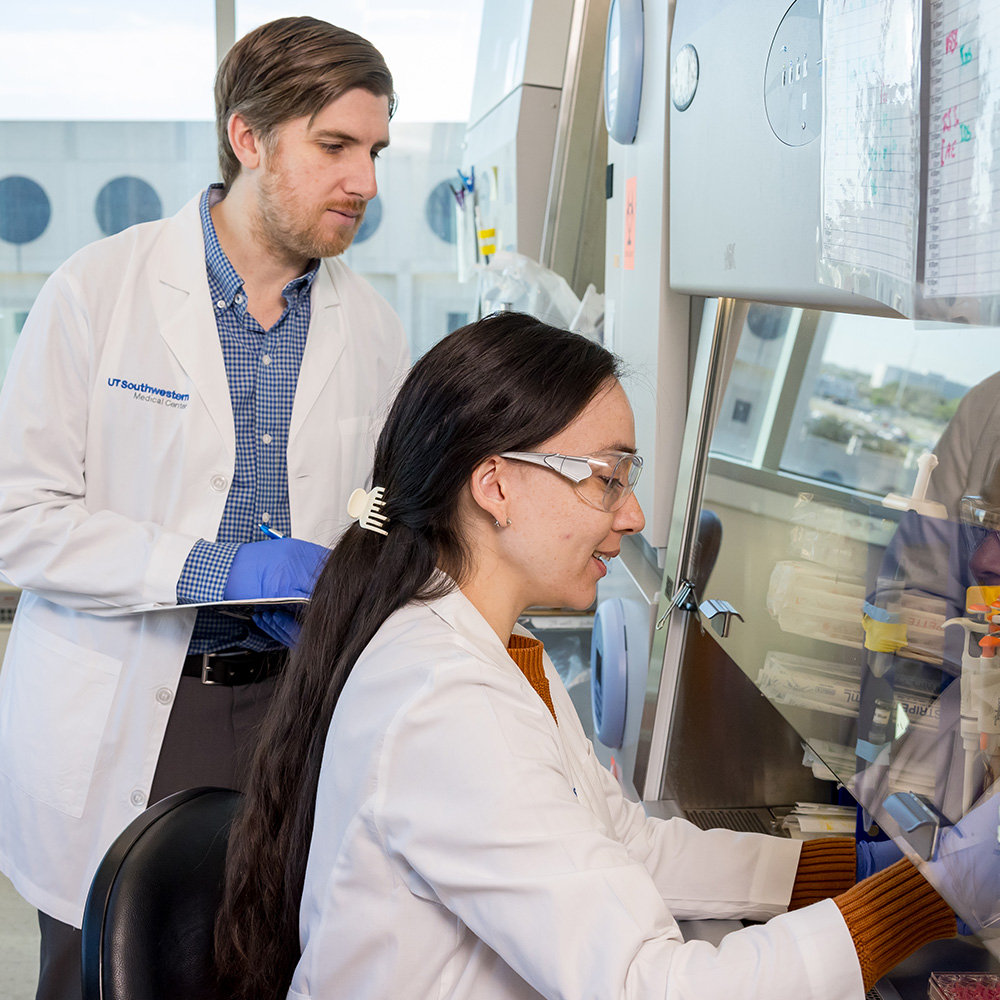Lung cancer researcher named Giant of Cancer Care
DALLAS – October 6, 2015 – Cancer biologist Dr. John Minna, with the Harold C. Simmons Comprehensive Cancer Center at UT Southwestern Medical Center, has been named a “Giant of Cancer Care” in recognition of his work developing lung cancer cell lines that are now used to develop and test new therapies by thousands of researchers worldwide.

The award, presented by the Intellisphere Oncology Specialty Group, recognizes 12 physicians nationwide for groundbreaking accomplishments in their field. Dr. Minna is Professor and Director of the Nancy B. and Jake L. Hamon Center for Therapeutic Oncology Research, and Director of the W.A. “Tex” and Deborah Moncrief Jr. Center for Cancer Genetics. Dr. Minna, Professor of Internal Medicine and Pharmacology, co-directs the Experimental Therapeutics Program at the Simmons Cancer Center.
“Dr. Minna has been an outstanding leader in lung cancer research for more than two decades, and we are very pleased to see his insightful work recognized with this award,” said Dr. James K.V. Willson, Associate Dean of Oncology Programs at UT Southwestern, Professor and Director of the Simmons Comprehensive Cancer Center, and holder of The Lisa K. Simmons Distinguished Chair in Comprehensive Oncology.
Dr. Minna was selected by peers for his highly influential work in translating molecular and radiotherapy discoveries in lung cancer. The award is dedicated to those who have helped save, prolong, or improve the lives of patients with cancer, and celebrates the achievements of leading researchers and educators whose discoveries have propelled the field forward and established the building blocks for future advances.
“I am honored by the ‘Giant of Cancer Care’ award. This recognition also honors the fantastic group of fellow scientists and clinicians who I have worked with over the years on lung cancer research. They are a world-class team,” said Dr. Minna, who holds the Sarah M. and Charles E. Seay Distinguished Chair in Cancer Research and the Max L. Thomas Distinguished Chair in Molecular Pulmonary Oncology.
The research started when Dr. Minna arrived at UT Southwestern in 1991 with his longtime collaborator Dr. Adi Gazdar, Professor in the Hamon Center for Therapeutic Oncology Research and of Pathology, and holder of the W. Ray Wallace Distinguished Chair in Molecular Oncology Research. Both physician scientists were formerly at the National Cancer Institute (NCI). The two have carefully developed and curated lung cancer cell lines since the 1970s — a collection of about 300 that is now the world’s largest.
These cell lines are regularly tapped to develop and test new therapies by thousands of researchers worldwide. The early, intense focus on the biology of lung cancer put UT Southwestern at the forefront internationally of the current molecular revolution in lung cancer research.
Their work also laid the foundation for the university’s research award in 1996, in collaboration with MD Anderson Cancer Center, of a highly competitive Specialized Program of Research Excellence (SPORE) grant from the NCI. The UT SPORE program, now in its 18th year, is the largest thoracic oncology effort in the U.S.
“UT Southwestern Medical Center, along with our Simmons Cancer Center, is one of the few places in the world with the whole package — the clinical, surgical, medical, and radiation oncology expertise; the infrastructure to get specimens into the lab and study them; and the comprehensive approach that involves biology and genetic and chemical analyses of the tumors,” said Dr. Minna.
The UT SPORE grant, with annual funding of $2.5 million, leverages the talents of some of the world’s top lung cancer scientists, along with progress in genomics, to advance the goal of personalized medicine.
UT Southwestern’s Harold C. Simmons Comprehensive Cancer Center is the only National Cancer Institute-designated comprehensive cancer center in North Texas and one of just 45 NCI-designated comprehensive cancer centers in the nation. The Simmons Cancer Center includes 13 major cancer care programs with a focus on treating the whole patient with innovative treatments, while fostering groundbreaking basic research that has the potential to improve patient care and prevention of cancer worldwide. In addition, the Center’s education and training programs support and develop the next generation of cancer researchers and clinicians.
The Simmons Cancer Center is among only 30 U.S. cancer research centers to be named a National Clinical Trials Network Lead Academic Participating Site, a prestigious designation by the NCI, and the only cancer center in North Texas to be so designated. The designation and associated funding is designed to bolster the cancer center’s clinical cancer research for adults and to provide patients access to cancer research trials sponsored by the NCI, where promising new drugs often are tested.
About UT Southwestern Medical Center
UT Southwestern, one of the premier academic medical centers in the nation, integrates pioneering biomedical research with exceptional clinical care and education. The institution’s faculty includes many distinguished members, including six who have been awarded Nobel Prizes since 1985. The faculty of more than 2,700 is responsible for groundbreaking medical advances and is committed to translating science-driven research quickly to new clinical treatments. UT Southwestern physicians provide medical care in 40 specialties to about 92,000 hospitalized patients and oversee approximately 2.1 million outpatient visits a year.
###
Media Contact: Lori Sundeen Soderbergh
214-648-3404
lori.soderbergh@utsouthwestern.edu
To automatically receive news releases from UT Southwestern via email, subscribe at www.utsouthwestern.edu/receivenews




